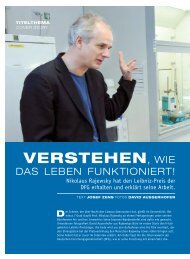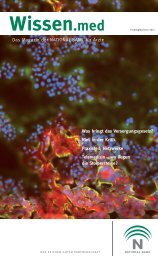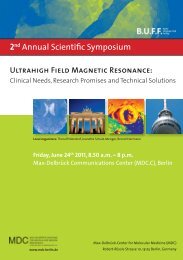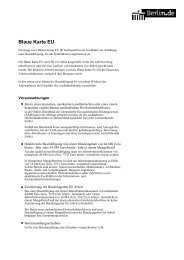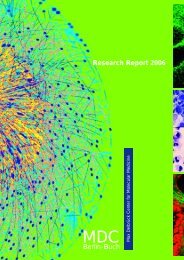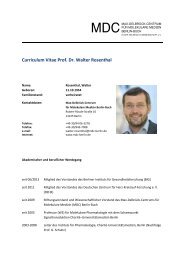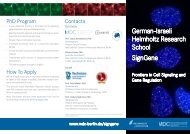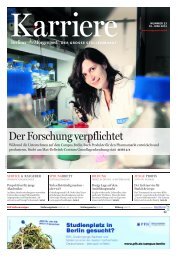Research Report 2010 - MDC
Research Report 2010 - MDC
Research Report 2010 - MDC
You also want an ePaper? Increase the reach of your titles
YUMPU automatically turns print PDFs into web optimized ePapers that Google loves.
Berlin Institute for Medical SystemsBiology, BIMSBThe <strong>MDC</strong> has launched a major expansion of its currentscientific activities in the area of systems biology: TheBerlin Institute for Medical Systems Biology.The aim ofthis initiative is to consolidate current scientific trends suchas increasing interdisciplinarity, and the availability of hugeamounts of data from new types of experiments and highthroughputgenomic platforms. This information needs tobe integrated into a systematic and quantitative understandingof all scales of life. The BIMSB is creating a researchenvironment for excellent scientific groups with interdisciplinaryand systems biology approaches at the <strong>MDC</strong>.The Berlin Institute for Medical Systems Biology will closelycollaborate with research institutions and universities inBerlin, and a new research building is planned to be constructedin Berlin-Mitte, most likely at the ‘Campus Nord’ ofthe Humboldt University. Promising talks have already beenheld between the <strong>MDC</strong>, HU-Berlin and the Berlin Senate.The Federal Ministry of Education and <strong>Research</strong> (BMBF) hasallocated 7.5 million euros for the period of 2008-<strong>2010</strong> andthe Senate of Berlin is complementing this with up to 4.4million euros. During this period young research groups andan international exchange program will start their researchand activities in Berlin-Buch. Major investments in high-endtechnologies will enable the BIMSB to set up state-of-theartscientific technology platforms for genomics, proteomics,metabolomics and bioinformatics. The funding forthe BIMSB was announced on May 5th 2008 by Germany’sEducation and <strong>Research</strong> Minister Annette Schavan as part ofthe BMBF initiative “Advanced <strong>Research</strong> and Innovation inthe New States” (Spitzenforschung und Innovation in denneuen Ländern). During the initial phase, the first juniorgroups have been recruited and an international exchangeprogram has been started with the Center for FunctionalGenomics of New York University (NYU), USA. This has beenaccompanied by major investments in technology platformsin the areas of genomics, proteomics, metabolomics andbioinformatics, which are used by <strong>MDC</strong> and external groups.The scientific missionBasic and biomedical research has provided a wealth ofinformation about the role of individual genes in various diseases.Despite these discoveries and the progress made, ithas been extremely challenging using this knowledge tounderstand disease and design and improve treatments. It isbecoming increasingly clear that disease processes involvecomplex interactions between hundreds of genes, proteinsand metabolites. Especially the most prevalent and devastatingdiseases such as cancer, cardiovascular disease, dia-Mit dem zunächst auf Projektbasis operierenden BerlinerInstitut für Medizinische Systembiologie(BIMSB) und dem geplanten Ausbau als integralerBestandteil des <strong>MDC</strong> hat das <strong>MDC</strong> eine bedeutende Entwicklungin der biomedizinischen Forschung, das Gebiet der Systembiologie,aufgegriffen. Das Ziel ist die Konsolidierung dergegenwärtig wissenschaftlichen Trends zu verstärkter Interdisziplinarität,der rasanten Genierung von sehr großenDatenmengen durch die immer stärkere Ausnutzung undWeiterentwicklung modernster Hochdurchsatz-Technologienund anderer Technologien, wie z. B. modernster Imaging-Verfahren.Daraus ergibt sich die Notwendigkeit der Integrationdieser Vielzahl an Informationen, um ein systematisches, qualitativesund quantitatives Verständnis der Beziehungeninnerhalb und zwischen den verschiedenen Ebenen biologischerOrganisation, von der Funktion einzelner Gene bis hin zukomplexen Wechselwirkungen in Zellen, Organen und Organismen,zu erreichen. Im BIMSB werden exzellente wissenschaftlicheForschungsgruppen mit interdisziplinärer und systembiologischerAusrichtung zusammengeführt. Durch dieenge Vernetzung innerhalb des <strong>MDC</strong> mit den bestehenden<strong>MDC</strong>-Gruppen können vorhandene Stärken mit neuesten Entwicklungenoptimal verbunden und ausgenutzt werden.Bereits jetzt schon unterstreichen erste Ergebnisse erfolgreicherZusammenarbeit, die auch in diesem Bericht zu findensind, die Berechtigung und Richtigkeit des eingeschlagenenWegs. Darüber hinaus wird die enge Kooperation des <strong>MDC</strong> mitden anderen Forschungseinrichtungen in Berlin und insbesondereden Berliner Universitäten über das BIMSB vertieft undstark ausgebaut. Daher hat sich das <strong>MDC</strong> entschlossen, dasneue Forschungsgebäude zentral in der Mitte Berlins, voraussichtlichauf dem Campus-Nord der Humboldt-Universität zuBerlin, zu errichten. Erste vielversprechende Gespräche zwischen<strong>MDC</strong>, HU-Berlin und dem Berliner Senat wurden bereits geführt.Für die Startphase des BIMSB hat das Bundesministerium fürBildung und Forschung (BMBF) für den Zeitraum von 2008 bis<strong>2010</strong> 7,5 Millionen ¤ bereitgestellt. Um 4,4 Millionen ¤ hat derSenat von Berlin diese Mittel ergänzt. Die Bereitstellung derMittel für das BIMSB als Teil der BMBF-Initiative „Spitzenforschungund Innovation in den neuen Ländern“ wurde am 5.Mai 2008 durch die Ministerin für Bildung und Forschung, Dr.Annette Schavan, verkündet. Während dieser Startphase wurdendie ersten Nachwuchsforschungsgruppen rekrutiert undein internationales Austauschprogramm mit dem Zentrumfür Funktionelle Genomik der New York University (NYU), USA,gestartet. Durch große Investitionen in Technologieplattformenim Bereich Genomik, Proteomik, Metabolomik und Bioinformatikwurde eine ausgezeichnete infrastrukturelle Basisgeschaffen, die von den Gruppen des <strong>MDC</strong> und externen Gruppengenutzt wird.190 Berlin Institute for Medical Systems Biology



